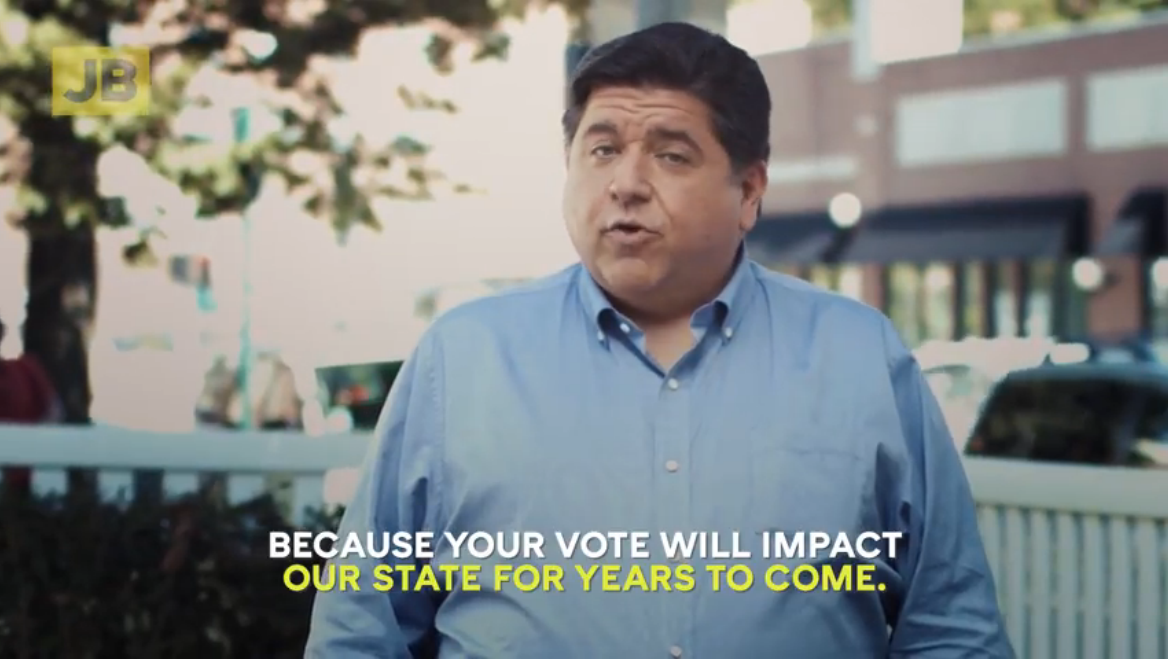The other morning, I was listening to Spotify's Coffee Table Jazz channel, my favorite writing-in-a-café soundtrack. As my uninterrupted thirty minutes of free listening expired and the last mellow piano note faded, I heard a voice that's become all too familiar during this campaign season:
"This is JB Pritzker. There's no such thing as a vote that doesn't matter. You can early vote now. We need to beat Bruce Rauner, so Illinois can be a firewall against Donald Trump. I want to remind you that you can make your voice heard by voting. There's too much at stake to sit this one out."
Later that night, I went onto YouTube to listen to Vic Mensa's "16 Shots," the local rapper's hip hop-as-journalism song about the Laquan McDonald shooting. Before it played, I had to watch yet another ad, also for JB Pritzker.
How had the candidate gotten all up in my ears when I was just trying to relax and listen to music? As a jazz fan in Chicago, had I been profiled as a likely demographic voter? Was he targeting Vic Mensa streams across the board?
By now, we're used to political ads on television. They go all the way back to Adlai Stevenson ("Vote Stevenson, vote Stevenson, a man you can believe in, son").
But as we absorb more and more entertainment from websites and apps, candidates are following us there — especially those like JB with unlimited advertising budgets. If you watch videos or listen to music online in Illinois, JB Pritzker will hunt you down — and remind you to cast an early vote for him.
"If you can buy advertising, someone's gonna put a political ad there," says Madeline Meininger, a senior analyst at Kantar Media. "As audiences move to newer forms of media, smart advertisers move. Especially if you're targeting a younger demographic, that's where to go. There's been a rise in digital advertising, but it's booming, and it's been exponential in 2018."
I’m not the only music fan whose nerves Pritzker has frayed. Here’s what irritated Spotify users are saying on Twitter.
if i hear another jb pritzker ad on my spotify im gonna lose it
i dont have the $$ for premium man
— ˎˊ˗ (@seulishi) October 26, 2018
Spotify is 90% JB Pritzker commercials
— Rachel Borland (@BorlandRachel) October 24, 2018
If I get one more Ad for JB Pritzker on Spotify I swear I'll start campaigning for whoever the other guy is just out of annoyance.
— Nate Rardin (@The_Nate_Rardin) October 23, 2018
The day that JB Pritzker campaign ads stop playing once every 4 songs on spotify will be the best day of my life
— Max Schiewe (@maxschiewe43) October 31, 2018
The music streaming service played a role in the 2016 presidential campaign, too. Hillary Clinton released a "She's With Us" playlist heavy on Stevie Wonder, Christina Aguilera, and John Legend — musicians who played a benefit concert for her. Barack Obama cut an ad reminding listeners to vote.
This year, though, politics on Spotify is moving down to the state level.
I got ahold of the Pritzker campaign, which was all too happy to explain why its boss has been interrupting my jazz playlist. Pritzker isn't just advertising on Spotify and YouTube, but on Pandora, Hulu, and Facebook, according to his communications director, Galia Slayen. She called the campaign's digital program "honestly one of the best in the nation. We're reaching voters in ways voters have never been reached before, and we're doing it on a scale it's never been done [before]."
Digital platforms, she explained, allow politicians to reach various demographic groups more precisely than TV or radio. For instance, the Pritzker campaign targeted Facebook and YouTube ads at voters who favored marijuana legalization by using data from an online survey by Civis Analytics. The survey asked voters' opinions on a wide variety of issues; Civis then used that data to model voters likely to be pro-legalization.
"You have so much data about who you're reaching," Meininger said. "In digital, I know X, Y, and Z about people who listen to Coffee Table Jazz. Even if they're not picking out you, they'll do a profile about people who listen to this type of music."
In 2016, Hillary Clinton won voters under 45, while Donald Trump won voters over 45. Younger people are more likely to use streaming services, which makes digital advertising more important for Democrats.
"Democrats, especially, need to invest more in digital," said Pritzker's digital director, Megan Clasen. "Digital reaches young people and TV reaches older people." (Rauner's campaign did not answer an interview request for this story.)
From the sound of it, we're just going to have to get used to hearing political ads with our music. The only way to avoid them is to go back to paying for songs and listening to them on iPods, the way we did in the 2000s. Or pay $10 a month for Spotify Premium and $12 for YouTube Premium.
That may be worth it — because the political ads are only going to get more obnoxious. Pritzker's campaign might seem ubiquitous, but it's only a mild introduction to the art of digital advertising. He's richer than Scrooge McDuck, so he doesn't have to beg for money, and he's so far ahead of Rauner in the polls that he rarely runs negative spots. (Clasen says the campaign is emphasizing "get to know JB" ads on digital platforms.) Let's thank our lucky stars that Kwame Raoul and Erika Harold aren't employing this technology in their mudslinging attorney general's race.
As annoying as the ads are, they’re obviously effective. After hearing JB Pritzker pester me to early vote every morning for a week, I went out and early voted.



